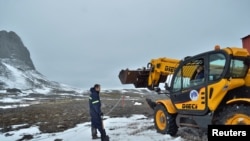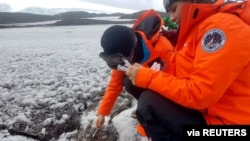Scientists from Argentina are working to understand more about microorganisms found in Antarctica that may be able to help clean up pollutants like plastic and diesel fuel.
The scientists believe the very small organisms eat pollution left behind by fuel and possibly plastic waste. The study results could be useful for wider environmental issues.
The scientists are working to find out if the organisms –bacteria and fungi native to Antarctica – can also work in warmer climates.
The scientists found that the microorganisms can digest the waste created by diesel fuel, which is a common source of heat and electricity at research bases in Antarctica.
Scientists have a reason for wanting to reduce pollution in Antarctica. The continent is protected by a rule created in 1961 that says it can be used for research only if it is left in good condition.
Dr. Lucas Ruberto is a biochemist working on the study. He said the organisms that live in the Antarctic soil can eat and break apart hydrocarbon pollution.
Ruberto and other scientists went to the Carlini research base in December. The team carried out tasks related to bioremediation – or returning something back to its natural state. They cleaned soil affected by diesel fuel by using native microorganisms and plants.
The scientists found that the process, which can be used during Antarctica’s warm season, removed 60 to 80 percent of pollutants in soil. Ruberto said the team helped the microbes by adding nitrogen, humidity and air flow to improve soil conditions.
"Basically with that we get the microorganisms to biologically reduce, with a very low environmental impact, the level of contaminants," Ruberto told Reuters reporters. A contaminant is something that makes a substance no longer suitable for use.
The scientists are now trying to research how the microbes could help clean up plastic waste in other places. Both fuels and plastics are polymers – molecules made up of mainly carbon and hydrogen.
The researchers are looking into whether the microorganisms native to Antarctica can eat plastic waste. They are collecting pieces of plastic from Antarctic waters and looking to see if the microbes are “degrading” – or breaking down -- the plastic.
Nathalie Bernard is an expert in plastic biodegradation. She said, “If we find that it is indeed degrading plastic, the next step would be to understand how it does that.”
The long-term goal, she added, is to create a process in which microorganisms can help clean up plastic and fuel pollution in other parts of the world.
I’m Dan Friedell.
Dan Friedell adapted this story for Learning English based on a report by Reuters.
Will the organisms be used in other parts of the world? Write to us in the Comments Section and visit our Facebook page.
Words in This Story
diesel – n. a type of fuel used in engines
humidity – n. a measure of moisture in the air
impact – n. an influence or effect on something






